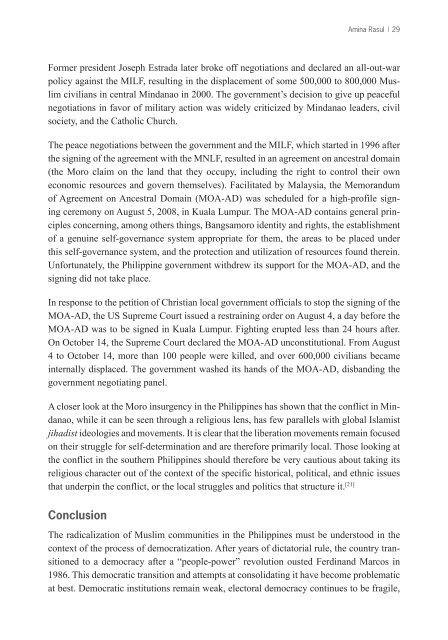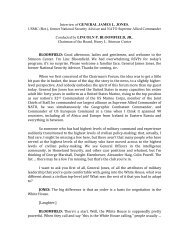Islam and Politics - The Stimson Center
Islam and Politics - The Stimson Center
Islam and Politics - The Stimson Center
You also want an ePaper? Increase the reach of your titles
YUMPU automatically turns print PDFs into web optimized ePapers that Google loves.
Amina Rasul | 29<br />
Former president Joseph Estrada later broke off negotiations <strong>and</strong> declared an all-out-war<br />
policy against the MILF, resulting in the displacement of some 500,000 to 800,000 Muslim<br />
civilians in central Mindanao in 2000. <strong>The</strong> government’s decision to give up peaceful<br />
negotiations in favor of military action was widely criticized by Mindanao leaders, civil<br />
society, <strong>and</strong> the Catholic Church.<br />
<strong>The</strong> peace negotiations between the government <strong>and</strong> the MILF, which started in 1996 after<br />
the signing of the agreement with the MNLF, resulted in an agreement on ancestral domain<br />
(the Moro claim on the l<strong>and</strong> that they occupy, including the right to control their own<br />
economic resources <strong>and</strong> govern themselves). Facilitated by Malaysia, the Memor<strong>and</strong>um<br />
of Agreement on Ancestral Domain (MOA-AD) was scheduled for a high-profile signing<br />
ceremony on August 5, 2008, in Kuala Lumpur. <strong>The</strong> MOA-AD contains general principles<br />
concerning, among others things, Bangsamoro identity <strong>and</strong> rights, the establishment<br />
of a genuine self-governance system appropriate for them, the areas to be placed under<br />
this self-governance system, <strong>and</strong> the protection <strong>and</strong> utilization of resources found therein.<br />
Unfortunately, the Philippine government withdrew its support for the MOA-AD, <strong>and</strong> the<br />
signing did not take place.<br />
In response to the petition of Christian local government officials to stop the signing of the<br />
MOA-AD, the US Supreme Court issued a restraining order on August 4, a day before the<br />
MOA-AD was to be signed in Kuala Lumpur. Fighting erupted less than 24 hours after.<br />
On October 14, the Supreme Court declared the MOA-AD unconstitutional. From August<br />
4 to October 14, more than 100 people were killed, <strong>and</strong> over 600,000 civilians became<br />
internally displaced. <strong>The</strong> government washed its h<strong>and</strong>s of the MOA-AD, disb<strong>and</strong>ing the<br />
government negotiating panel.<br />
A closer look at the Moro insurgency in the Philippines has shown that the conflict in Mindanao,<br />
while it can be seen through a religious lens, has few parallels with global <strong>Islam</strong>ist<br />
jihadist ideologies <strong>and</strong> movements. It is clear that the liberation movements remain focused<br />
on their struggle for self-determination <strong>and</strong> are therefore primarily local. Those looking at<br />
the conflict in the southern Philippines should therefore be very cautious about taking its<br />
religious character out of the context of the specific historical, political, <strong>and</strong> ethnic issues<br />
that underpin the conflict, or the local struggles <strong>and</strong> politics that structure it. [21]<br />
Conclusion<br />
<strong>The</strong> radicalization of Muslim communities in the Philippines must be understood in the<br />
context of the process of democratization. After years of dictatorial rule, the country transitioned<br />
to a democracy after a “people-power” revolution ousted Ferdin<strong>and</strong> Marcos in<br />
1986. This democratic transition <strong>and</strong> attempts at consolidating it have become problematic<br />
at best. Democratic institutions remain weak, electoral democracy continues to be fragile,

















